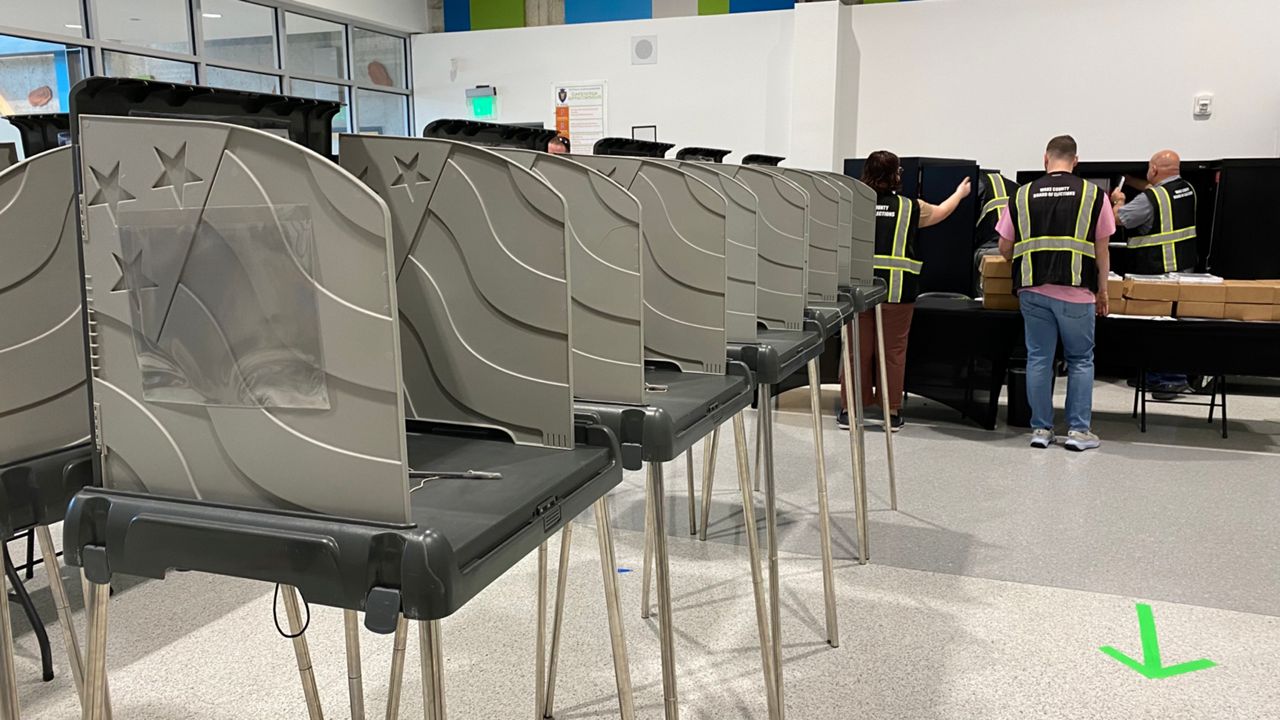Much of the national attention is already looking ahead to the 2024 presidential election. But in North Carolina, hundreds of cities and towns across the state are getting ready to elect local leaders this fall.
There are open races for mayor in Durham and Chapel Hill.
There are also elections for mayor and city council seats this fall in Chapel Hill, Cary, Fayetteville and in smaller cities and towns in central North Carolina.
In Durham, eight candidates are running for the Oct. 10 primary. Twelve candidates are running for three at-large seats on the Durham City Council.
Durham’s mayoral candidates include two sitting city council members, DeDreana Freeman and Leonardo Williams, and state Sen. Mike Woodard, himself a former Durham council member. The other candidates are Charlitta Burruss, Jontae Dunston, Nicholas Pettiford, Marshall Williams and Sylvester Williams.
Voters will choose the two top candidates for Durham mayor and six top candidates for city council in the nonpartisan primary election. The top candidates will go to the General Election on Nov. 7.
Chapel Hill voters will choose between two familiar names for their next mayor: Jessica Anderson and Adam Searing, both members of the town council. Mayor Pam Hemminger decided not to run for reelection and endorsed Anderson for the seat.
There’s a big race in the works for the Chapel Hill-Carrboro City Schools Board, with 19 candidates vying for four seats. In that race, weeks went by in the filing period without a single candidate putting their hat in the ring. But just as the filing period was set to close, a flood of candidates, including three incumbents, filed to run for the seats.
In Fayetteville, incumbent Mayor Mitch Colvin will have a rematch with Freddie de la Cruz. Colvin beat the retired Army Lt. Col. in the 2022 election with almost 63% of the vote. Fayetteville voters will also cast ballots for members of the next city council.
The General Election is set for Nov. 7. Sixteen counties statewide will also have primary elections, to narrow the field for crowded races. Most primaries are set for Oct. 10. There are two exceptions: Charlotte and Sanford will hold primaries on Sept. 12.
The big change for elections this year in North Carolina will be voter ID. Voters will be required to show photo identification to cast a ballot.
The North Carolina Supreme Court overturned its own decision earlier this year to require voter ID.
The 2023 municipal elections will be the first time voters are required to show ID with the new law. Most will be able to show their driver’s license.
For those without a photo ID, people can get one for free from the North Carolina Department of Motor Vehicles. County election boards will also give photo IDs to people who need them, and require less paperwork than the DMV.
There are also exceptions for people who cannot show ID, including lack of transportation, disability or illness, not having the documents needed to get an ID, or for a lost or stolen ID.
People who vote by mail will be required to include a photocopy of their photo ID along with their ballot.
County elections officials have a busy schedule in the coming months, with hundreds of local elections around the state to manage.
Aug. 18: Voter registration deadline for primaries in Charlotte and Sanford
Aug. 24: One-stop, in-person early voting begins for primaries in Charlotte and Sanford
Sept. 5: Absentee ballot request deadline for September primaries (5 p.m.)
Sept. 9: One-stop, in-person early voting ends for September primaries.
Sept. 12: Election Day for primaries in Charlotte and Sanford
Sept. 15: Civilian voter registration deadline for October elections
Sept. 21: One-stop, in-person early voting begins for October elections
Oct. 3: Absentee ballot request deadline for October elections
Oct. 7: One-stop, in-person early voting ends for October elections
Oct. 10: Election Day in municipalities with October elections
Oct. 13: Voter registration deadline for November elections
Oct. 19: One-stop, in-person early voting begins for November elections.
Oct. 31: Absentee ballot request deadline for November elections (5 p.m.)
Nov. 4: One-stop, in-person early voting ends for November elections.
Nov. 7: Election Day in municipalities with November elections



